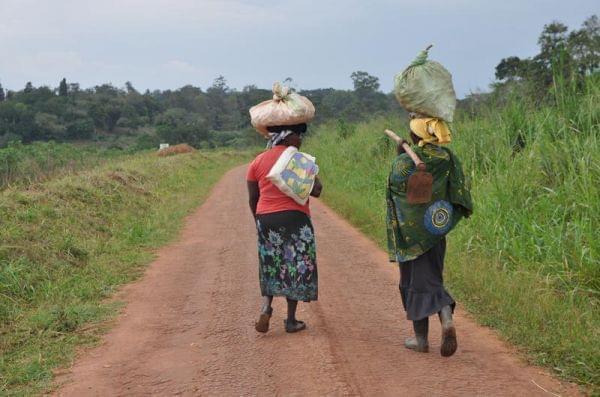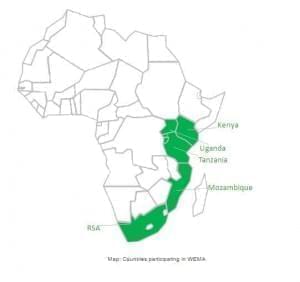Altruism Or PR? How Monsanto Plans To Snag A Foothold In African Seed Markets

Two women walk home after a day of work at Uganda's National Agricultural Research Organisation in Namulonge. Durrie Bouscaren/St. Louis Public Radio
The world’s largest seed companies have their eye trained on Africa’s farming industry. A few, including St. Louis-based Monsanto, see drought-resistant corn as the key to an untapped market.
But some African civil service organizations are wary of the genetically modified seeds Monsanto hopes to introduce.
Although only a few of African countries allow genetically modified crops outside of confined field trials, some are considering laws to legalize them. Climate change has intensified dry spells and made weather patterns less predictable, and farming more difficult. This year in southern Africa, widespread droughts have left about 50 million people in need of food aid, according to the United Nations.
To seed sellers like Monsanto, such trends seem like an opportunity.
“The biggest area of arable land in the world that is underutilized at this point is in Africa, so they need agricultural development and growth,” said Mark Edge, Monsanto’s director of collaborations for developing countries. “There’s a real business argument to be made.”
In Uganda’s capital city, motorcycle taxis zip by on uneven roads, fruit vendors carry baskets of bananas, and shoppers weave their way through the densely packed stalls of Owino Market, where Annet Nakidde helps run a small seed and fertilizer store.

In her shop in Kampala, Annet Nakkide holds up a package of Longe 10-H, developed for the Drought Tolerant Maize for Africa Initiative.
She pulls out a plastic package of corn seeds, stained pink with a pesticide. It’s a drought-tolerant, hybrid seed called Longe 10-H, developed by an earlier initiative to produce drought-resistant corn seeds that is not affiliated with Monsanto. Such programs attract millions of dollars from donors like the Bill and Melinda Gates Foundation and USAID.
The seeds in Nakkide's shop are conventionally bred hybrids, which must be purchased anew every year instead of saved and re-used.
Because hybrid seeds are expensive, Nakkide said most farmers use open-pollinated varieties of seeds that can be saved and used again, as they have for generations. Though the hybrid, drought-tolerant seeds improve yields during a dry spell, she said Ugandan farmers need something that works better.
“The seasons are changing. We used to receive rain for like four months, five months. These days we get it within like, three months and it is finished,” Nakkide she said.
A foothold in the market
Four years ago, Mark Edge led the U.S. marketing effort when Monsanto released corn seeds that were genetically modified to tolerate drought — the first of their kind. According to regulatory tests, the seeds improve yields by about five percent during a moderate drought, compared to conventionally grown varieties. The seeds were planted on about 2.9 million U.S. acres this year, according to the company.

Corn seeds for sale in Owino Market, Kampala.
Edge and his colleagues believe the same drought-resistant corn that American farmers use can be adapted for Sub-Saharan Africa, and a plan to distribute them is already in place.
In 2007, Monsanto began its Water Efficient Maize for Africa program, or WEMA. The company licenses its drought tolerant varieties of corn that are not genetically modified to an organization called the African Agricultural Technology Foundation, royalty free. The foundation then provides the seeds to African seed companies, which cross pollinate them with local corn varieties to sell to farmers.
In South Africa, which allows genetically modified crops, seed companies also can use Monsanto’s Bt corn strain, which is resistant to pests like stem borer. In 2018, program coordinators plan to introduce seeds that include the drought resistant gene.
The majority of funding for the $100 million venture comes from the Bill & Melinda Gates Foundation. Even though Monsanto makes no money through the program, Edge said it’s more than altruism.

A map of countries participating in Monsanto's Water Efficient Maize for Africa project.
“Your choice is can you go in now, and you know that you’re not going to make much money in it but can you lay those foundations for 10 or 15 years from now where it’s going to be,” Edge said.
“Companies that are involved in agriculture look at the world and say there’s a growing population and the needs are there, the place it’s going to have to come from is improvement in Africa.”
In Kenya, Uganda, Tanzania, Mozambique and South Africa, 250,000 households have purchased hybrid seeds through WEMA, according to Monsanto.
Though Monsanto is undergoing an acquisition by the German pharmaceutical company, Bayer, officials said they did not expect new ownership to affect their commitments to the WEMA project.
For GMO’s, countries weigh their options
Locally, public opinion regarding GM crops is mixed. The African Centre for Biodiversity, based in South Africa, published a report about the WEMA project last year, titled “Profiting from the Climate Crisis, Undermining Resilience in Africa.”
Doug Gurian-Sherman, a senior scientist for the Washington, D.C.-based Center for Food Safety, calls the project “a lot of noise about very little.” If the years and costs involved to develop genetically modified corn and get it through the regulatory process are taken into consideration, the five percent benefit to yields seems less impressive.
“Really what it is, is a desire of a company like Monsanto — which is not hard to understand — to want to improve its public relations profile, but compared to dozens of conventionally bred traits it’s really not very effective,” Gurian-Sherman said.
Improvements to genetic engineering, such as the CRISPR technique, hold some promise, he said. But improving drought tolerance is incredibly complicated with current technology.
“When you look at maize in particular, it’s not a particularly drought tolerant crop to begin with," Gurian-Sherman said. "There are other crops that are indigenous to Africa, that are not always as productive but tend to be much more resilient in terms of heat and drought tolerance.”
If the newly introduced seeds are expensive, the benefits could become concentrated among large-scale farmers who can afford them, leaving subsistence growers behind, he said.

Corn grows among homes built in a settlement for refugees from South Sudan in northern Uganda.
Credit: Durrie Bouscaren/St. Louis Public Radio
In Uganda, the public debate over whether or not to allow GMO’s continues as field trials test strains of bananas, cassava and sweet potatoes.
“I think the government could really harness our organic capabilities,” said Barbara Ntambirweki, an attorney and research officer for a civil service organization in Kampala called ACODE. “It’s just that the agricultural sector needs an overhaul.”
In September, Ntambirweki said the government could do more to assist farmers by investing in infrastructure, machinery, and controls to keep fake seeds out of the marketplace.
“If they want to introduce GMO’s in the country, they should introduce GMO’s to places where they have poor soils, and not in places where our organic capacity is full,” she said.
Godfrey Asea, who coordinates the WEMA project for Uganda’s national crops research institute, said he thinks the law should pass. When it comes to corn, he said, the crop is valuable as both a food source and export.
“It is a choice of luxury, I’ll call it," Asea said. "For those who have food and those who have no food.”
This piece is part of a series reported by St. Louis Public Radio health reporter Durrie Bouscaren, who visited Uganda for a fellowship with the International Women’s Media Foundation, which is funded by the Howard G. Buffett Foundation. The HBF is also a donor to the WEMA project.
Follow Durrie on Twitter: @durrieB.
